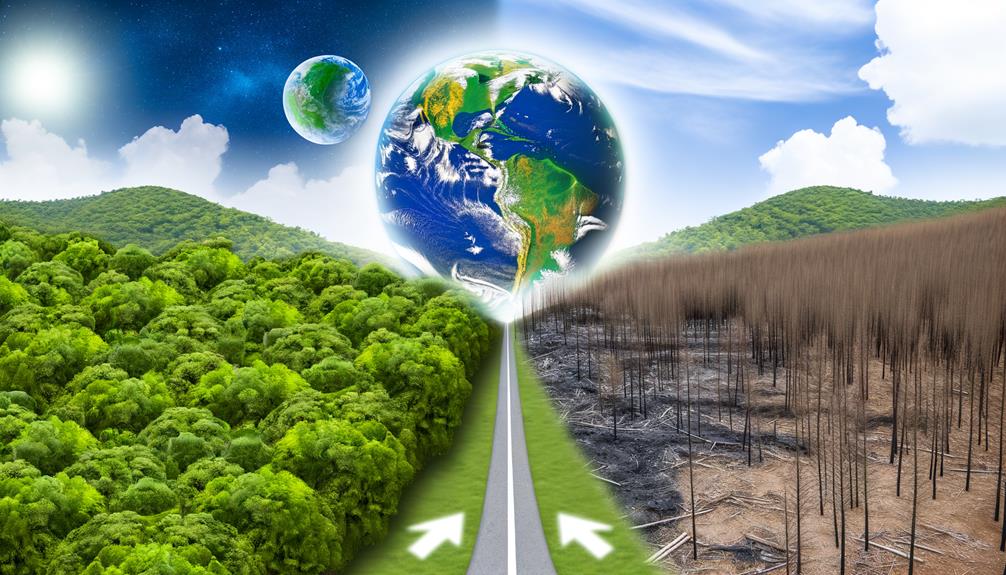Imagine, if you will, the gentle rustling of leaves, clear skies, and the warmth of the sun on your skin – a vision of an environment in harmony. Now, consider this: your dietary choices have the power to shape this reality. You’re probably aware that a shift to an animal-free diet can have profound effects on personal health, but have you considered its potential impact on our planet’s health? The reality is that your fork wields more influence than you might realize. Embarking on an exploration of the climate impact of animal-free diets, we’ll unearth intriguing insights into the role your food choices play in the big picture of climate change. It’s a complex, multi-layered issue that demands our attention, so let’s get started, shall we?
Key Takeaways
- Animal-free diets have a significantly lower carbon footprint compared to meat-rich diets, with vegan meals producing 75% fewer climate-heating emissions.
- Plant-based diets not only reduce emissions but also have a positive impact on water use, with vegetarian diets reducing water consumption by 54%.
- Adopting animal-free diets can contribute to the conservation of wildlife habitats, decreasing destruction by 66%.
- The global food system, particularly livestock production for meat and dairy, is a major contributor to greenhouse gas emissions, and a radical reduction in meat and dairy intake is necessary for a sustainable dietary shift.
Understanding Veganism and Climate Change
Embracing a vegan diet can remarkably reduce your carbon footprint, with vegan meals producing 75% fewer climate-heating emissions compared to a meat-rich diet, potentially making it a powerful tool in the fight against climate change. You’re not just cutting down on meat; you’re choosing a lifestyle that significantly reduces greenhouse gases and counters global warming.
Your dietary shifts away from meat and dairy and towards plant-based alternatives have a profound impact. The climate impact of food is often overlooked, but animal agriculture is a potent greenhouse gas emitter. Even organic pork, the lowest-impact meat, causes eight times more climate damage than oilseed, the highest-impact plant.
The UK Health Alliance on Climate Change recommends policies to reduce meat consumption, highlighting the environmental impacts of our food choices. By opting for animal-free diets, we can halt the increase of atmospheric gases for 30 years, according to recent studies.
Choosing a vegan diet is more than a personal health choice; it’s a commitment to serving our planet. It’s about acknowledging our role in nurturing a sustainable global food system. Together, we can turn the tide, making dietary choices that respect and protect our shared home.
Reducing Emissions With Plant-Based Diets
Building on the idea of veganism as a climate solution, let’s explore how specifically plant-based diets can dramatically cut emissions, safeguard wildlife, and conserve water resources. The choices you make at the dinner table have a profound environmental impact. Shifting towards plant-based diets and reducing meat consumption can play a crucial role in reducing emissions and addressing climate change.
- Plant-based diets result in 75% less climate-heating emissions compared to diets with high meat consumption. This significant reduction showcases the power of dietary choices in managing global greenhouse gas emissions.
- Adopting vegetarian diets can reduce water use by 54%. Given the increasing scarcity of water resources, this is a step towards conscientious conservation.
- Animal-free diets can decrease the destruction of wildlife habitats by 66%. This highlights the role of food production choices in preserving biodiversity.
The global food system contributes a third of total emissions driving global warming. It’s time to embrace the climate impact of plant-based diets. By making mindful dietary choices, you’re not only serving your health, but also protecting our shared planet. Let’s champion environmentally-friendly eating habits, one meal at a time.
Global Meat and Dairy Consumption Analysis
While you’re considering the environmental impact of your dietary choices, it’s crucial to understand that global meat and dairy consumption analysis reveals a significant environmental footprint. This analysis is not just a study but a mirror reflecting our food system’s impact on the planet. Livestock production for meat and dairy contributes substantially to greenhouse gas emissions, exacerbating the climate impact.
Your dietary choices matter. Animal-based foods, especially meat and dairy, often have a larger carbon footprint than their plant-based counterparts. It’s not about completely eliminating these foods, but rather making conscious decisions to reduce consumption where possible.
It’s important to remember that meat and dairy consumption varies globally due to cultural and economic factors. However, regardless of the region, a radical reduction in meat and dairy intake is necessary for a sustainable dietary shift.
Adopting animal-free diets could significantly lower emissions and reduce our environmental impact. Let’s remember, our choices in the kitchen have a ripple effect across the world, influencing the food system, the environment, and the climate. We all have a role to play in this global effort, and it begins with understanding and action.
Environmental Impact of Food Production
In the vast landscape of food production, it’s alarming to realize that diets heavy in meat and dairy contribute to 14.5% of global greenhouse gas emissions, causing massive environmental repercussions. Your food choices significantly affect your carbon footprint and the climate impact.
Consider these facts:
- Vegans, on average, have a 75% lower carbon footprint than meat eaters.
- Meat and dairy food consumption account for more than half of all food-related greenhouse gas emissions.
- Cutting down your meat intake can significantly reduce your dietary carbon footprint.
When you switch to animal-free diets, you’re not only improving your health, but also contributing to land use efficiency and reduction in emissions from livestock. The environmental impact of food production can be mitigated through dietary scenarios that lean towards plant-based diets.
It’s crucial to be culturally aware and respect dietary choices, but it’s equally important to understand the environmental consequences. Make a difference today, not just for yourself, but for the planet. Let’s embrace a sustainable lifestyle for a greener tomorrow.
Efficiency of Plant-Based Alternatives
You’ll find that plant-based alternatives are incredibly efficient, with emissions from these foods being 10 to 50 times smaller than those from animal products. This efficiency of plant-based alternatives is powerful in reducing the environmental impact.
A global switch to these foods can make a huge difference. Let’s take a glimpse at the potential impact of plant-based choices.
| Animal-based Foods | Plant-based Alternatives | |
|---|---|---|
| CO2 Emissions | High | 10 to 50 times less |
| Land Use | Extensive | Minimal |
| Water Use | High | Low |
The chart above clearly shows that the plant-based diet would be more sustainable. By following dietary guidelines that endorse vegan diets, we can collectively lower our carbon footprints.
However, remember that not all plant-based foods are created equal. For instance, coffee and chocolate have larger climate impacts due to factors such as fertilizers and land-use change. Therefore, your food choices are key.
The impact of plant-based, animal-free diets can help us tread lightly on our planet. It’s a viable solution that brings together the wellbeing of the Earth and our fellow living creatures. So, let’s embrace it!
Frequently Asked Questions
Do Vegan Diets Contribute to Climate Change?
You’re definitely onto something! Vegan diets, popular among climate activists, can reduce greenhouse emissions by 75%. Transitioning to sustainable food options, despite the challenges, lessens our environmental footprint and impacts the agricultural industry positively.
How Does Eating Animals Affect Climate Change?
Eating animals contributes to climate change through animal methane production, deforestation, and disruption of the food chain. It also increases livestock water usage, biodiversity loss, and extensive farming consequences like grazing land degradation.
Why Is a Meat Free Diet Better for the Environment?
Switching to a meat-free diet reduces deforestation, lowers emissions, and offers conservation benefits. You’ll save water, preserve soil, protect biodiversity, reduce methane, and improve energy efficiency, while also promoting food security and sustainable agriculture.
What Are the Potential Benefits of an Animal Free Diet?
You’ll experience health benefits like improved digestion, reduced obesity, and lower diabetes risk. Nutrient intake will increase, possibly reducing allergies. Your heart health may improve, and cancer risks could lower. Plus, it’s economically and ethically beneficial.







